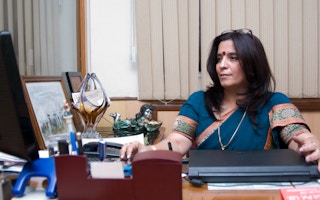‘Skewed’ investment
The Kashmir valley drew more than 16 million tourists to its snowy mountains and lush vistas this year - the highest number since British colonial rule ended in 1947 - after Covid-19 travel restrictions eased and the security situation improved.
But unemployment is still a challenge because of the lack of private industry, with its jobless rate hitting 24 per cent, triple the national average, data from the Centre for Monitoring Indian Economy think-tank showed.
Startup investors and entrepreneurs say the mountain region brings challenges - but also potential for development and growth, especially now internet connections have improved.
“Startups come out of Hyderabad and Bangalore, but to identify problems in the Himalayan belt and solving them takes a huge amount of courage,” said Syed Faaiz Qadri, 25, a co-founder at food logistics business Zarin.
The firm works with farmers to supply Kashmiri rainbow trout to restaurants and e-commerce platforms across India. They have faced difficulties ranging from militant encounters to a lack of cold-storage supplies needed to keep their food fresh.
The restoration of internet meant Zarin’s founders were able to use a Covid-19 lockdown last year to find and sign up new customers, and were ready with their first orders when travel restrictions lifted.
Both businesses and funders say new startups can benefit residents by creating jobs, finding new markets for their goods, and enabling growth in the conflict-stricken region.
Some internet-based firms found ways to navigate patchy network in the mountains.
FastBeetle - which serves more than 1,200 enterprises including many run by women selling products online - found poor data connections meant couriers could not look up addresses, and would often return to the office with undelivered parcels.
The founders moved from 4G to 2G to operate the app, which now functions even without the internet.
“We are making money on an internet-based company in a region where internet is patchy,” said Samiullah.
“People now believe they too can draw investment if we could.”
While a lion’s share of startup funding still goes to firms in big cities, government incentives and private capital can help correct the “skewed investment dynamics”, said Anuj Sharma, founder of ALSiSAR Impact, a startup incubator in Mumbai.
“The community is very responsive to these startups,” said Vishal Ray, at the Jammu and Kashmir Entrepreneurial Development Institute, a body set up by the regional government to support startups and entrepreneurs.
“They purchase and promote these brands - there is a strong affinity,” he said.
Content creators
Improved internet connectivity has also offered a boost to content creators, including women.
Syed Areej Safvi, 27, has been hailed as the first female performer of ladishah, a traditional Kashmiri musical form of storytelling.
“Being a female content creator is still considered taboo in a conservative society like Kashmir,” said Safvi, whose income is largely from her video content.
She recorded her first ladishah amid an internet shutdown in 2019, describing the situation in Kashmir, and quickly gained a following as internet restrictions were eased.
Today, she has more than 69,000 followers on Instagram, and about 72,000 subscribers on her YouTube channel.
India’s 637 million - and rising - number of smartphone users are driving a growing market for online content, according to a report by venture capital fund Kalaari Capital.
It is estimated there are some 80 million creators in the country, including 50,000 professional creators on regional video platforms. However, only a small minority make a good income from their work, it said.
Despite the limited opportunities and uncertain environment, better internet access has been a great leveller for women, said Safvi.
“Internet access has helped me grow my audience and experiment with different earning opportunities online,” she said.
“It helps every woman in Kashmir to break patriarchal barriers, overcome taboos and become self-sufficient.”
This story was published with permission from Thomson Reuters Foundation, the charitable arm of Thomson Reuters, that covers humanitarian news, climate change, resilience, women’s rights, trafficking and property rights. Visit https://www.context.news/.










